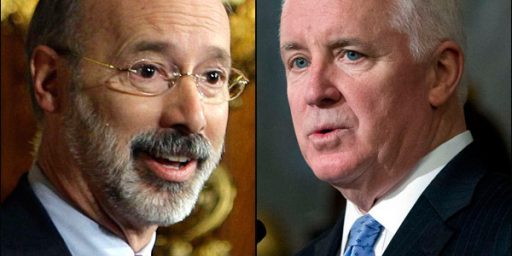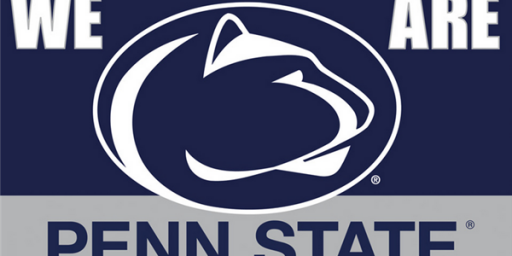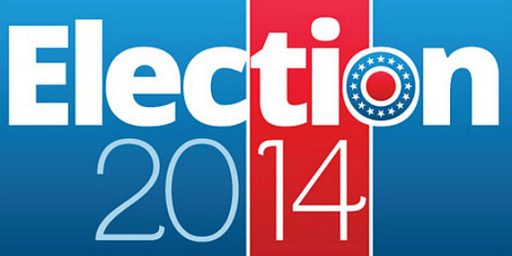Republican Governors Trailing Democratic Opponents In Five States
Along with capturing the House, Republicans also made headlines in 2010 by capturing a slew of Governor’s races, including races in states like Pennsylvania where Democrats seemed to be dominant. Those Governors elected in 2010 are up for re-election in 2014, though, and many of them are in trouble:
The polls, conducted by the Democratic-leaning PPP on behalf of MoveOn.org found the Democratic candidates in Maine, Kansas, Georgia, Pennsylvania, and Florida leading the Republican candidates.
• In Maine PPP found Republican Gov. Paul LePage (pictured) trailing Rep. Mike Michaud (D) 37 percent to 44 percent.
• In Kansas, Gov. Sam Brownback (R) trails Democratic gubernatorial candidate Paul Davis 41 percent to 45 percent.
• In Pennsylvania, Gov. Tom Corbett (R) is behind the generic potential Democratic candidate by double digits. PPP found Corbett trailing the generic candidate 56 percent to 34 percent.
• In the Georgia gubernatorial race, state Sen. Jason Carter (D) just barely leads Georgia Gov. Nathan Deal (R) 43 percent to 42 percent.
• In Florida, former Gov. Charlie Crist (D) leads Gov. Rick Scott (R), 49 percent to 42 percent.
Republicans will likely still pull of victories in at least some of these states. Governor LePage in Maine, for example, could benefit from the presence of a strong third party candidate in the race like he did in 2010. Kansas seems like a state that’s more likely to elect a Republican than a Democrat at this point, so there’s definitely hope for Governor Brownback. Finally, the races in Georgia and Florida are close enough at this point that one may as well call the race a toss up. The one state where things seem pretty much over for the Republican incumbent even this early is Pennsylvania, where Tom Corbett’s poll numbers remain in the same hole that they’ve been in for about the past two years.
Nonetheless, these state level races, as well as others in Michigan, Ohio, and Wisconsin, are worth paying attention to. In no small part because some of the men (and possibly women) running for re-election as Governor this year could run for President in 2016 and/or end up on the short list of potential running mates for the eventual Republican nominee.






That’s consistent with the anti-incumbent mood that some have suggested.
The basic question is whether the November elections will be anti-incumbent or anti-politician. If the latter it could result in a low turnout of historic proportions. Nearly anything can happen if the turnout is low enough.
Just as a benchmark in Chicago’s primaries last month the citywide turnout was around 10%.
“The polls, conducted by the Democratic-leaning PPP on behalf of MoveOn.org found the Democratic candidates in Maine, Kansas, Georgia, Pennsylvania, and Florida leading the Republican candidates.”
LOL, PPP???? Too funny. You guys at OTB still relying on the partisan hacks at PPP? Have you checked how PPP has done in non Presidential elections lately – most recently the FL district where they had former Guv candidate Sink leading the no name Rep Lobbyist by 5 points the day before the election. The no name Lobbyist beat Sink by 4pts. Have you checked how they did in the SC Special election, San Diego Mayors race and the WIS Guv recall election last year. In all cases, they had the Dem candidate up anywhere from 2 – 10 points up to a week before election day, and in all cases the Rep won. I would recommend you Google “PPP’s Track Record in Non Presidential elections” or something to that effect.
PPP has ZERO credibility in non presidential & off year elections. ZERO. They are a liberal propaganda & activist organ. Nothing more and nothing less. OTB does a disservice to its readers when it doesn’t point out PPP’s dubious record in recent off year & midterm elections and that they are partisan Dem organization.
Whatever PPP results are, I would add 10 points to the Rep candidate.
Kansas may seem like a place where Republicans are safe but Brownback is in big trouble. The state supreme court ordered the legislature to increase school funding and to fix the formulary to regain some equality between small and large districts. The legislature did that over the weekend and (just for fun!) stuck it to school teachers, stripping them of their right to a due process hearing when they get fired. They also gave tax cuts to businesses who donate to private school scholarship funds and introduced a new method of allowing larger, wealthier districts to increase the mill levy in a way that rural, poorer districts can’t match. I don’t think irate even begins to cover exactly how ticked off the moderate and liberals are right now. We’ve been bombarded by an ad campaign from Americans for Prosperity touting the governor’s record on education over the last few weeks. And the thing about Kansas is that we know who AFP is. They base their corporation here and while blaming them for everything on a national scale may be overdone, in Kansas, Charles and David Koch are not seen as mostly harmless billionaires. They are loathed by most and loved by the legislators that they bankroll.
PS, this poll was taken before the Screw the Teachers Act of 2014 was passed.
@Smooth Jazz:
Wow… after being so spectacularly wrong in your interpretation of polls during the last two presidential elections cycles, one might think you would have learned your lesson.
Oh wait, you’re performance trolling… right?
I mean, you have to be, throwing around terms like “Zero Credibility” with your easy to google record.
Because no one can be that lacking in self reflection.
I’ll give you Georgia, but presuming a 3% margin of error in favor of the Republican, Florida doesn’t look like a toss up to me.
Yes yes, polls this far out tell us nothing, blah blah.
@Smooth Jazz: You sure your name shouldn’t be “Bebop Jazz?” ’cause you are all over the place.
@Smooth Jazz: In other words, Smoovie is back to Unskew!!!!!
@Smooth Jazz:
Interesting – this is similar to how many liberals have come to view the Rasmussen and Gallup polling results.
Two things: (1) it’s too early to tell, but these are worthwhile snapshots of the moment, (2) we all remember how in 2012 Republicans dismissed all reality-based polling and had completely convinced themselves that Romney was on his way to an easy victory, so the recent GOP record of dismissing reality-based polling is not too good.
@al-Ameda:
Interesting. Rasmussen has pretty consistently reported the president’s approval rating as higher than the RCP average.
@Dave Schuler:
True, yet many liberals have complained that Rasmussen skews conservative. Still, liberal complaints about “skewed” polling results are small compared with constant conservative complaints about “skewed” polling (and general media bias.)
@al-Ameda & @Dave Schuler:
That’s because its sampling methodology did a few years ago. There’s a lot of evidence that they made some corrections to their sampling in recent years after being pretty far off in either 2008 or 2012 (I frankly can’t remember which and don’t have the time to go and research that today).
Polling seems to be very unreliable right now. When you have differences between polls of 10 points or more, then something is wrong. They don’t even overlap on the error ranges.
As for Governor’s races (and Senate for that matter), one thing to note is that you can’t gerrymander a state.
@matt bernius:In 2008, Rasmussen got the presidential race pretty accurately (52-46, compared with the actual results of 52.9-45.7). But in 2010, they heavily overestimated the Republicans, and their final poll for the 2012 race had Romney beating Obama 49-48.
After the 2012 race, Gallup (which also showed 49-48 for Romney) announced plans to improve its methodology. I am unaware that Rasmussen did, but feel free to correct me.
@Scott: “Polling seems to be very unreliable right now. When you have differences between polls of 10 points or more, then something is wrong.”
One of the problems is that, as any pollster will tell you, these special elections are almost impossible to poll well — you never know who is going to turn out, so the screens are all a matter of guessing.
@Kylopod: “In 2008, Rasmussen got the presidential race pretty accurately (52-46, compared with the actual results of 52.9-45.7)”
But this was, quite famously, Rasmussen’s game. They’d put out months worth of polls with ludicrous Republican advantages, but the last couple right before the election they’d heavily adjust so they could brag about being close.
@matt bernius:
Since founder Scott Rasmussen left, the poll results have looked dramatically different. I look forward to the opportunity to compare them to actual results and see how accurate they are now that the founder is no longer laying a heavy thumb on the scale for the GOP.